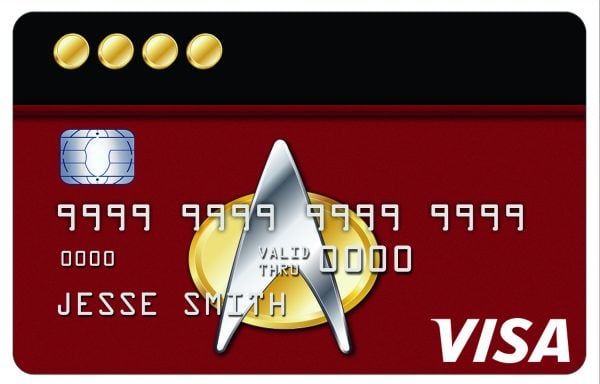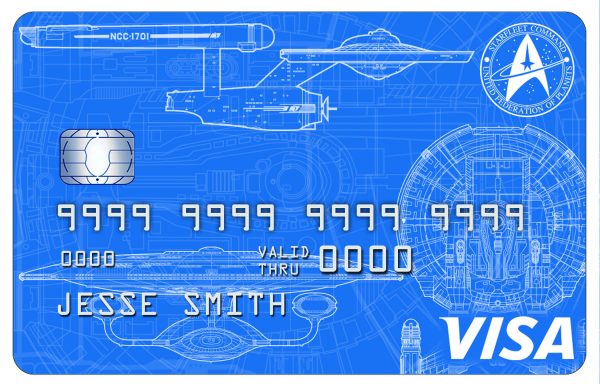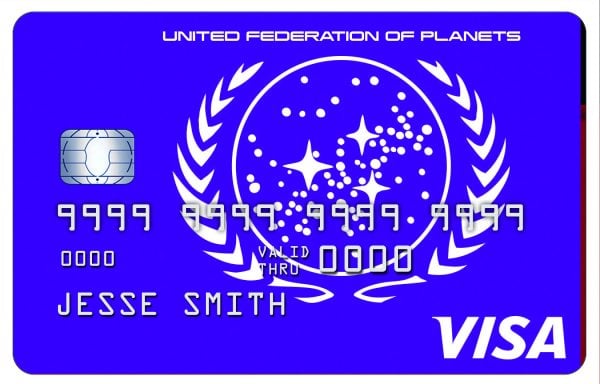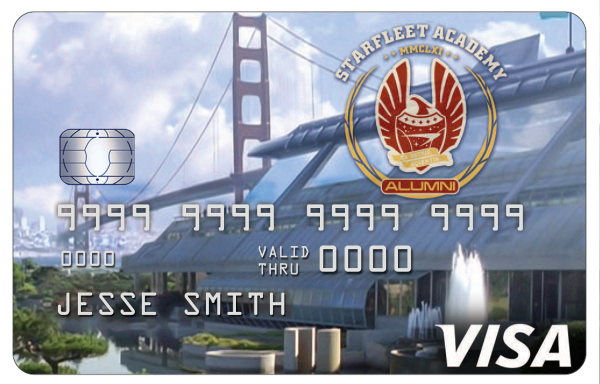5 Things to Know About the Star Trek Credit Card
The Star Trek Credit Card doesn't boldly go where no card has gone before. Unless you're a gas-guzzling die-hard fan, you may want to beam on up and out.

Many or all of the products on this page are from partners who compensate us when you click to or take an action on their website, but this does not influence our evaluations or ratings. Our opinions are our own.
» This page is out of date
The Star Trek Credit Card has been discontinued, so this page is out of date. Current accounts will be transitioned to different NASA Federal Credit Union products.
The Star Trek Credit Card, issued by NASA Federal Credit Union, can take your fandom to a frontier you likely already frequent: namely, the checkout line.

You can choose from four different card designs inspired by the franchise to proudly display at the register. And should you also want to dress the part, the card earns triple rewards on startrek.com merchandise like shirts, hoodies, badges and more.
However, the card charges an annual fee, and in terms of additional rewards and perks, it doesn't boldly go where no card has gone before. Unless you're a gas-guzzling die-hard Trekkie, you should probably beam on up and out.
Here are five things to know about the Star Trek Credit Card.
1. It's a decent cash-back enterprise ...
The Star Trek Credit Card earns:
3 points per $1 spent on startrek.com purchases.
2 points per $1 spent on gas station purchases.
1 point per $1 spent on all other purchases.
When redeemed for cash back, points are worth a penny and a half each, which is higher than the industry-standard value of one cent per point. (You can also redeem for gift cards, merchandise, travel, donations and other options, but point values vary for those choices.)

So your effective cash-back rates are 4.5% for startrek.com purchases, 3% for gas station purchases and 1.5% back on all other purchases. Those numbers are solid, but your rewards still may not add up as quickly as they could with another card. After all, how much "Star Trek" merchandise can you buy? (Maybe don't answer that.)
Plenty of other cards earn 3% back or higher on gas, but also on a wide variety of other spending. And while 1.5% is the current gold standard among flat-rate cash-back cards, some products offer 2% or more back on everything.
There is one feature the Star Trek Credit Card has that similar competitors don't — but it belongs in the minus column of your captain's log. See below.
2. ... but the $39 annual fee is illogical
Super-fans may be willing to pay it, but you can find any number of credit cards that offer more value for no annual fee at all.
For example, the Citi Double Cash® Card could be an option. It earns 2% cash back on everything: 1% when you buy and 1% when you pay it back. It has a $0 annual fee.
In short, good cards in this category typically don't charge annual fees.
3. The sign-up bonus is set to stun ...
For a limited time, the Star Trek Credit Card is offering an eye-catching welcome offer: You'll earn 20,000 bonus points when you spend $2,000 in the first 90 days of account opening — worth $300 when redeemed for cash back.
That's double the typical amount you'd expect to get from some cash-back credit cards. Of course, you'll still have to weigh it against a $39 annual fee.

If you're seeking a rich sign-up bonus with a $0 annual fee, take a look at the Bank of America® Customized Cash Rewards credit card. It offers a $200 online cash rewards bonus after you make at least $1,000 in purchases in the first 90 days of account opening.. You'll earn 3% cash back in a chosen category (from a list of six options) and 2% back at grocery stores and wholesale clubs (up to $2,500 in combined choice category/grocery store/wholesale club quarterly purchases). All other purchases earn 1% back.
Or the Capital One Quicksilver Cash Rewards Credit Card might be a good fit. For an annual fee of $0, it earns 1.5% back on purchases. It has a nifty sign-up bonus: Earn a one-time $200 cash bonus after you spend $500 on purchases within 3 months from account opening.
4. ... but you won't pay down debt at warp speed
If you're looking to finance a large purchase or chip away at existing debt by transferring a balance from a high-interest credit card, the Star Trek Credit Card isn't the best option.
True, it doesn't charge a balance transfer fee — but there's no 0% intro APR period either.
The card's ongoing interest rate might be better than you'll find elsewhere, assuming that you qualify for the lower end of the range (which will depend on your creditworthiness). But remember that you'll also have to pay an annual fee to hold this card.
Ideally, you'd find a card that offers two or even all three of the following zeroes: a $0 annual fee, a $0 balance transfer fee and a 0% introductory interest rate.
5. There's a membership requirement
You don't have to enroll in Starfleet Academy, but you do have to join the NASA Federal Credit Union. To qualify for membership, you must meet one of the following criteria:

You’re an employee or retiree of NASA headquarters, any NASA center or facility, or the National Academy of Sciences.
You’re a member or employee of any of the credit union’s partner companies or associations.
You are related to, or live in the same household as, a member of the credit union.
You’re a member of the National Space Society. If none of the above applies to you, this is your way in. The credit union offers a complimentary membership to the NSS.
Card images courtesy of NASA Federal Credit Union
Find the right credit card for you.
Whether you want to pay less interest or earn more rewards, the right card's out there. Just answer a few questions and we'll narrow the search for you.





